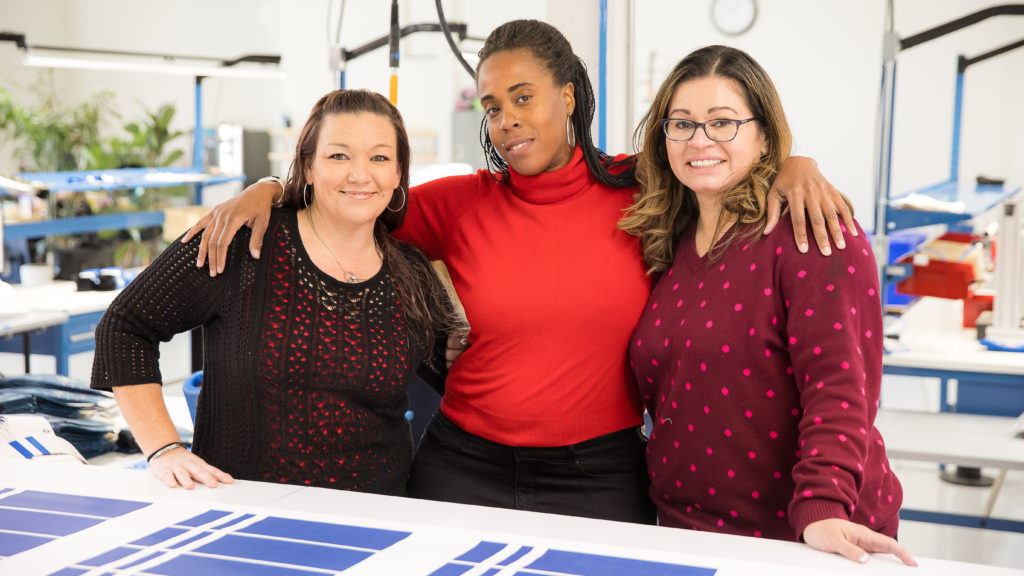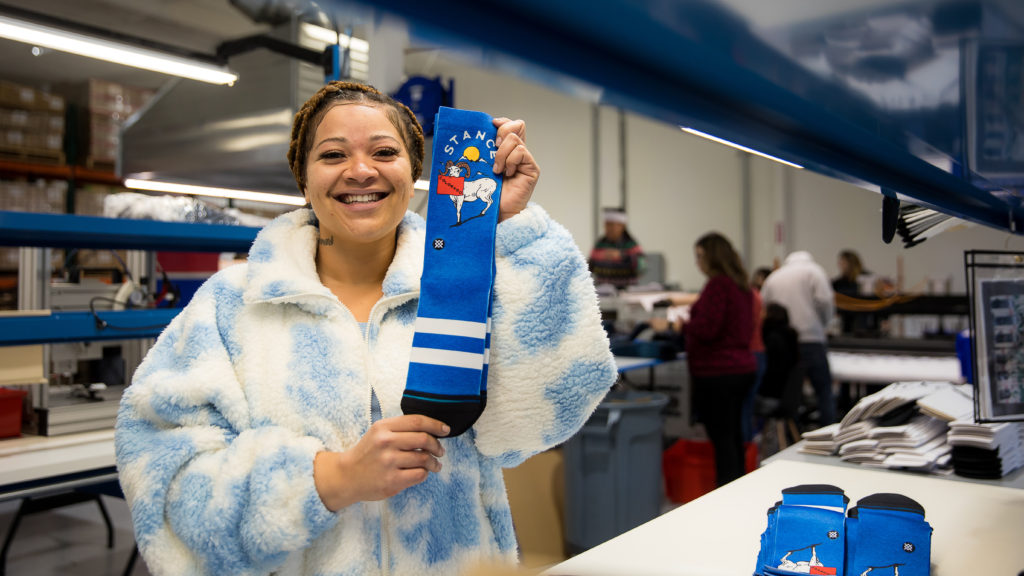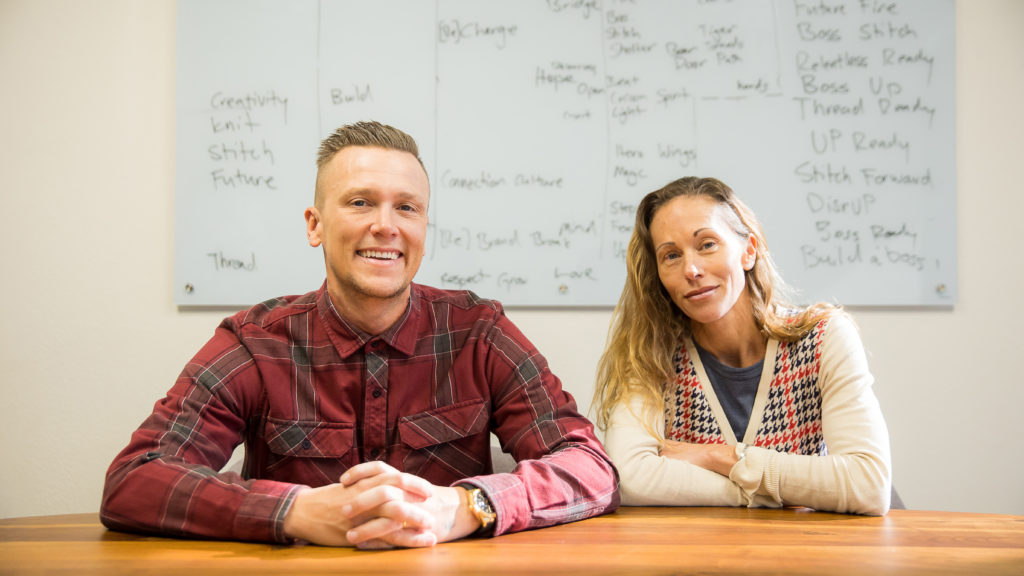
Since Taylor Shupe founded FutureStitch—a knitwear manufacturer—in 2017, the global textile and technology company has gone against manufacturing status quos by putting sustainability at the forefront. In 2020, the FutureStitch factory outside of Shanghai, China received LEED Platinum Certification—the highest level certification for energy efficiency and environmental responsibility.
With the opening of FutureStitch’s manufacturing facility in Oceanside, California in spring 2022, not only was Taylor bringing manufacturing back to the United States where one manufacturing job equates to five additional jobs created—he also saw an opportunity to invest in disadvantaged populations located in and around Oceanside. Taylor actively disrupted norms by addressing negative perceptions around hiring and retaining formerly incarcerated workers. He and his team focused on hiring women who have been impacted by the justice system.
“We’re shattering the old mindset of how we view people and the mistakes they have made,” says Sarah Porter, HR specialist at FutureStitch. “I understand why we judge; judging can feel like a survival technique. However, if we can allow the space to be more open minded, we won’t miss out on developing relationships and friendships, or the opportunity to work with such resilient individuals. I want people to understand that they are more than their worst mistake.”
How On-the-Job Training Impacts More than the Bottom Line
Our work is about more than manufacturing; it’s about creating training opportunities, building support and creating hope.
Sarah Porter, HR Specialist at FutureStitch

To date, FutureStitch has hired and trained more than 15 women impacted by the justice system with the support of On-the-Job Training (OJT) funds secured through the San Diego Workforce Partnership. OJT helps offset the cost of hiring and training employees by reimbursing employers up to 50% of a trainee’s hourly wage for a maximum of 1,040 hours.
For FutureStitch, OJT allowed them to hire individuals with almost no formal training to start working at their company, which has a steep learning curve. Sarah was able to interview someone who lacked manufacturing skills but was otherwise a great fit since the first three to six months of their training would be reimbursed. “Our work is about more than manufacturing; it’s about creating training opportunities, building support and creating hope,” Sarah says.
OJT also helps remove other barriers. Crafting a resume or securing an interview is a huge barrier to entry for job seekers, even more so for those impacted by the justice system. OJT breaks barriers for the job seeker and gives the employer more flexibility in who they hire. Through OJT, FutureStitch can hire individuals with almost no formal training because their investment in their employees is partially funded through OJT.
FutureStitch is proud to be part of breaking the cycle of recidivism by offering formerly incarcerated women a sustainable, livable income, as well as opportunities to upskill. Through OJT, FutureStitch has grown and invested in their employees by providing training in basic computer skills, public speaking, CPR and forklift certification, and weekly yoga and meditation classes.
“Technology moves so fast,” says Sarah. “If you are incarcerated or away from society, you’ll be left out and left behind.”
In response to staff requests for learning opportunities, FutureStitch launched BossStitch—a program that taps into core values of inclusivity and curiosity through entrepreneurship training. BossStitch’s first cohort is coming to an end, with participants launching their own personally branded website. Once complete, participants get a Chromebook to use in other classes to build on their business ideas.
Investing in Scalable Change
With the right tools and soft and hard skills, any employee can be trained to become a business leader or entrepreneur.
Taylor Shupe, FutureStitch founder

“I would love to see other employers take the same steps as FutureStitch and invest in standardized curriculum that provides training and education opportunities to their employees, says Taylor. “BossStitch has proven economically viable and can be scaled as well.”
He notes that in a factory environment, retention is integral for productivity. At FutureStitch, both retention and productivity are higher than the national average. While FutureStitch pays above market wages, Taylor credits the sense of community, and the intentional respect and support networks cultivated and stewarded at the facility to the staff’s happiness.
“Investing in productivity is the key to happy returns,” Taylor says, and is also confident their model is a great way to prevent recidivism, which affects about 76% of women who have been previously incarcerated.
FutureStitch is working on launching direct-to-consumer production and retail of their soft goods. Eventually, they want to move into footwear design and manufacturing as well, reducing an 80+ step process to five through a factory-to-consumer model.
Taylor plans to create a scalable model of micro-factories, like the Oceanside facility, around the United States that use the same employment system (i.e., hiring and training individuals impacted by the justice system) and are environmentally friendly.
“Formerly incarcerated individuals have had their legacies taken from them—whether due to bad decisions or to bad luck,” says Taylor. “Their mistakes shouldn’t define them as their entire person. With the right tools and soft and hard skills, any employee can be trained to become a business leader or entrepreneur.”
